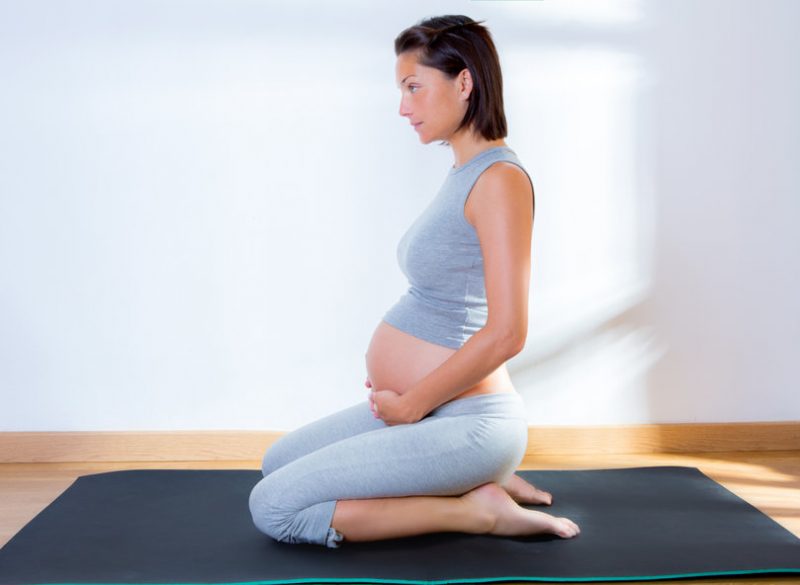Pregnancy is an exciting time in a woman’s life, but often it’s less glowing and more grumbling. As if it weren’t enough to deal with morning sickness and swollen feet, many pregnant women suffer from orthopedic problems like carpal tunnel syndrome, SI joint issues, pelvic pain and more.
We spoke to the experts at OrthoCarolina to find out what to expect when we’re expecting, how to treat it and when to get the doctor involved.

Big changes can mean big pain
Being pregnant means lots of changes to your body — some good, and some not so good.
Dr. Kelli Tryon says rapid weight gain, weakening/stressing of core muscles and ligament-loosening hormones can be a painful combination.
“Pregnancy taxes the musculoskeletal system (and) alters the body’s center of gravity, which results in stresses on the lumbar and pelvic systems,” says Dr. Konrad Sekula.
Constantly fluctuating hormones and water retention can make matters worse. Certified Hand Therapist Stacy Rumfelt said those changes can cause pregnant women to be more susceptible to problems like carpal tunnel syndrome.
Here are a few common orthopedic issues you may encounter during pregnancy:
- Lower back pain
Tryon said low back pain is by far the most common complaint she receives from pregnant women. The culprit could be your SI joint, or simply a combination of your changing weight distribution and expanding waistline.
Sekula said pre-existing conditions like muscle weakness, joint instability and previous pregnancies can make mothers more likely to experience lower back pain. - Pubic area pain
Some pubic/pelvic area pain and pressure is to be expected as baby makes its way toward the exit, but some pregnant women get an extra dose of pelvic pain. Called Symphisis Pubis Dysfunction, it affects the ligaments and muscles supporting your pubic symphysis, the area where your pelvic bones join in the front of your pelvis, Tryon says. - Plantar fasciitis
Need a foot rub? Tryon said many expectant moms find themselves complaining of plantar fasciitis, an inflammation of the thick band of tissue that connects your heel to your toes.
Sharp heel pain is common first thing in the morning, or when you stand up after sitting for an extended period of time, she says. - Carpal tunnel syndrome
If you’re pregnant and experiencing numbness or tingling in your fingers, wrists and hands, carpal tunnel syndrome could be the culprit. As you retain more fluid, the fluid can compress the nerves, causing CTS symptoms. Rumfelt said according to one study, 62 percent of pregnant women suffer from CTS, and it’s most common during the third trimester. It’s also more common for women who with gestational diabetes.
Don’t suffer in silence
If you’re having orthopedic pain during pregnancy, when should you go see a physical therapist? Tryon says the sooner the better.
“A common misconception is that women need to grin and bear the pain throughout their pregnancy,” she says. “Many orthopedic problems stem from weakened and overstretched muscles and ligaments, which is exactly what we treat as physical therapists. My message to all pregnant women out there is that these conditions are treatable!”
Konrad said physical therapists can help pregnant women by suggesting specific exercises they can do at home to help overcome back and pelvic pain. PTs can also teach women how to improve their body mechanics when lifting, bending, sitting and carrying.
Occupational therapists can also help pregnant women deal with CTS.
Some pregnant women experience CTS symptoms so severe they start to lose their dexterity or coordination (dropping things or becoming clumsy). Rumfelt said professional occupational therapists can help those women work on fine motor skills.
Patient education is another big part of symptom relief.
Women who work with vibratory tools like dental assistants and some factory workers may not realize the vibration can aggravate CTS symptoms, Rumfelt said. She helps educate those women about the importance of wearing anti-vibration gloves and taking frequent breaks throughout the day to stretch.
Staying fit and other ways to prevent pain
If you’re hoping to prevent orthopedic pain during pregnancy entirely, we have some good news and bad news.
“I’m not sure there’s a sure-fire way to avoid any and all orthopedic issues because the changes to a woman’s body during pregnancy are multifactorial and far-reaching,” Tryon said. “That said, staying active and fit along with eating healthy, nutritious foods are great places to start.”
Sekula said a large Norwegian study found that pregnant women who exercised three or more times a week during pregnancy were less likely to report pelvic girdle pain and low back pain.
“Gardening, walking, cycling, hiking, swimming and playing are all forms of exercise,” Sekula said. “I educate my patients on remaining active daily. The body usually develops aches and pain if activity is limited or less regular.”
If you’re dealing with CTS, Rumfelt recommends putting on a splint at night to stay ahead of symptoms, and trying to avoid sleeping with your wrist curled against your body.
“It’s like a garden hose going around a corner and crimping the flow,” she says. “If we hyper-flex our wrist, we’re cutting off the blood flow and the signals the nerve sends. That leads to abnormal sensations like electric, shooting pains.”
The doctors also suggested a few other ways for pregnant women to avoid orthopedic pain:
- Wear comfortable shoes with good arch support
- Avoid sitting for long periods of time on soft surfaces like recliners or sofas
- Find your “happy place” through meditation, yoga, deep breathing, massage or music to relax your body and mind
Most pregnancy-related orthopedic issues go away once your baby is born, but for some unlucky women, their problems may linger.
After delivery, stay ahead of CTS and other orthopedic symptoms by switching up positions when you breastfeed and hold your baby. Rumfelt suggests trying alternative holds like the “football” or side-lying position.
Rumfelt said if your symptoms haven’t cleared up by your follow-up appointment to your OB/GYN, tell your doctor.
Have more questions about orthopedic pain during pregnancy? Contact the experts at OrthoCarolina.
